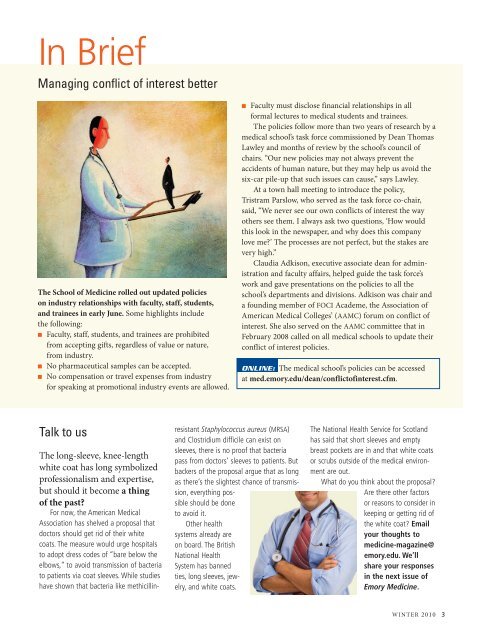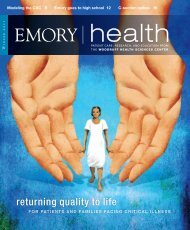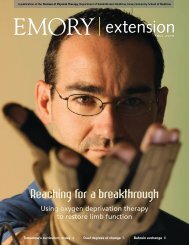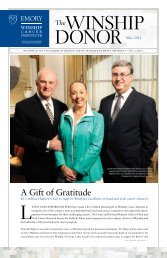medicine - Woodruff Health Sciences Center - Emory University
medicine - Woodruff Health Sciences Center - Emory University
medicine - Woodruff Health Sciences Center - Emory University
You also want an ePaper? Increase the reach of your titles
YUMPU automatically turns print PDFs into web optimized ePapers that Google loves.
In Brief<br />
Managing conflict of interest better<br />
The School of Medicine rolled out updated policies<br />
on industry relationships with faculty, staff, students,<br />
and trainees in early June. Some highlights include<br />
the following:<br />
n faculty, staff, students, and trainees are prohibited<br />
from accepting gifts, regardless of value or nature,<br />
from industry.<br />
n No pharmaceutical samples can be accepted.<br />
n No compensation or travel expenses from industry<br />
for speaking at promotional industry events are allowed.<br />
Talk to us<br />
The long-sleeve, knee-length<br />
white coat has long symbolized<br />
professionalism and expertise,<br />
but should it become a thing<br />
of the past?<br />
For now, the American Medical<br />
Association has shelved a proposal that<br />
doctors should get rid of their white<br />
coats. The measure would urge hospitals<br />
to adopt dress codes of “bare below the<br />
elbows,” to avoid transmission of bacteria<br />
to patients via coat sleeves. While studies<br />
have shown that bacteria like methicillin-<br />
resistant Staphylococcus aureus (MRSA)<br />
and Clostridium difficile can exist on<br />
sleeves, there is no proof that bacteria<br />
pass from doctors’ sleeves to patients. But<br />
backers of the proposal argue that as long<br />
as there’s the slightest chance of transmission,<br />
everything possible<br />
should be done<br />
to avoid it.<br />
Other health<br />
systems already are<br />
on board. The British<br />
National <strong>Health</strong><br />
System has banned<br />
ties, long sleeves, jewelry,<br />
and white coats.<br />
n faculty must disclose financial relationships in all<br />
formal lectures to medical students and trainees.<br />
The policies follow more than two years of research by a<br />
medical school’s task force commissioned by Dean Thomas<br />
Lawley and months of review by the school’s council of<br />
chairs. “Our new policies may not always prevent the<br />
accidents of human nature, but they may help us avoid the<br />
six-car pile-up that such issues can cause,” says Lawley.<br />
At a town hall meeting to introduce the policy,<br />
Tristram Parslow, who served as the task force co-chair,<br />
said, “We never see our own conflicts of interest the way<br />
others see them. I always ask two questions, ‘How would<br />
this look in the newspaper, and why does this company<br />
love me?’ The processes are not perfect, but the stakes are<br />
very high.”<br />
Claudia Adkison, executive associate dean for administration<br />
and faculty affairs, helped guide the task force’s<br />
work and gave presentations on the policies to all the<br />
school’s departments and divisions. Adkison was chair and<br />
a founding member of fOCI Academe, the Association of<br />
American Medical Colleges’ (AAMC) forum on conflict of<br />
interest. She also served on the AAMC committee that in<br />
february 2008 called on all medical schools to update their<br />
conflict of interest policies.<br />
Online: The medical school’s policies can be accessed<br />
at med.emory.edu/dean/conflictofinterest.cfm.<br />
The National <strong>Health</strong> Service for Scotland<br />
has said that short sleeves and empty<br />
breast pockets are in and that white coats<br />
or scrubs outside of the medical environment<br />
are out.<br />
What do you think about the proposal?<br />
Are there other factors<br />
or reasons to consider in<br />
keeping or getting rid of<br />
the white coat? Email<br />
your thoughts to<br />
<strong>medicine</strong>-magazine@<br />
emory.edu. We’ll<br />
share your responses<br />
in the next issue of<br />
<strong>Emory</strong> Medicine.<br />
WINTER 2010 3
















